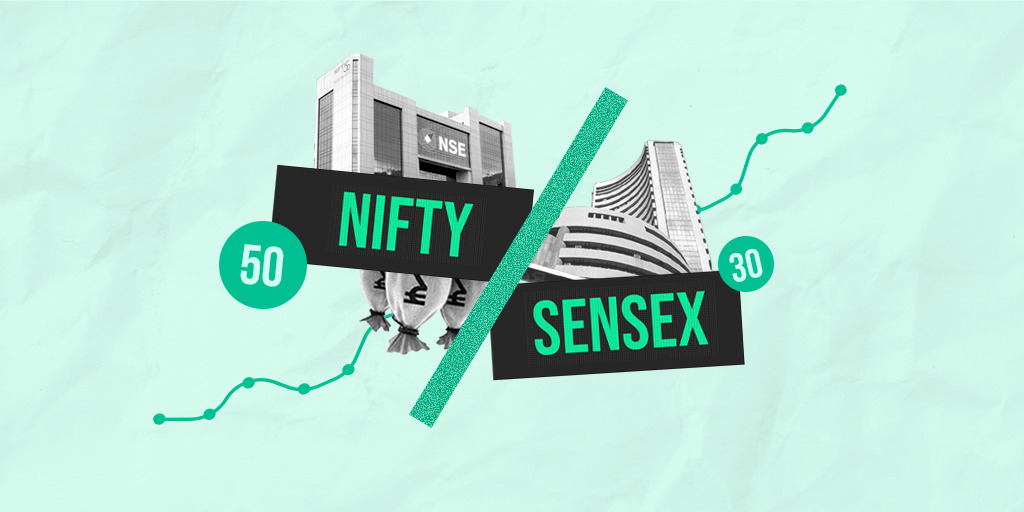Nifty 50 vs Sensex: Comparing the Two Leading Stock Market Indices in India
What is Stock Market Index? – A Broad Understanding
Stock market index is basically a term used to describe a segment of the stock market that helps assess the market’s overall performance. Index is another name for an indicator that is used to benchmark the performance of a portfolio’s returns.
The Stock market’s financial performance serves as one of the metrics to gauge a Nation’s Economic Development. To track the stocks of every company listed on the stock exchange, however, would be impossible given the high number of listings on the stock market. That’s why, a sample is picked to symbolise the movement of the entire market and that sample is referred to as Index.
The Index represents both the country’s and the companies’ economic growth. It is essentially a representative sampling of the best corporations as measured by free-float market capitalisation. An overall assessment of the market trend for the day can be obtained by looking at the direction of the sample companies.
To understand in detail, index stocks are chosen from across all the key industries rather than just one particular area, like automobiles, banking or the chemicals business. As a result, indices assist us in presenting the whole picture rather than simply a certain stock market sector. It is also possible to use invest in index mutual fund and exchange-traded funds (ETFs) to invest in stock indices.
The Indian stock market is represented by Sensex and Nifty 50. They serve as the barometers for portfolios of individual investors, industry growth and stock market trends in the nation.
Nifty 50 and Sensex may sound similar as they are frequently used to refer to the same thing. However, they are very different from one another. To learn more about their meanings and distinctions, let us understand Sensex and Nifty 50 in detail.
What is Sensex?
The Sensex consists of the aggregate value of 30 equities of companies with BSE listings. Sensex is one of India’s oldest stock index.
The Sensex is an important indicator of the overall health of the Indian stock market and is widely followed by investors and analysts both in India and around the world. It reflects the performance of the Indian stock market and is used as a benchmark to measure the performance of mutual funds, investment portfolios, and other financial instruments.
What is NIFTY 50?
Nifty 50, also known as the National Stock Exchange Fifty, is a stock market index of the National Stock Exchange of India (NSE). It consists of 50 of the largest and most liquid companies listed on the NSE, representing various sectors of the Indian economy, such as financial services, information technology, energy and consumer goods.
Like the Sensex, Nifty 50 is also an important indicator of the overall health of the Indian stock market and is widely followed by investors and analysts. It is used as a benchmarj to measure the performance of investment portfolios, mutual funds and other financial instruments. The Nifty 50 and the Sensex are considered the two most prominent and widely followed stock market indices in India.
Difference between Sensex and NIFTY 50
| Feature | Sensex | Nifty 50 |
|---|---|---|
| Exchange | Bombay Stock Exchange | National Stock Exchange |
| Number of stocks | 30 | 50 |
| Base Year | 1978-79 | 1995 |
| Base Value | 100 | 1000 |
| Calculation | Free float market cap | Free float market cap |
| Launch Date | January 1, 1986 | April 21, 1996 |
| Composition | Blue-chip companies | Blue-chip companies |
| Industry | Diverse industries | Diverse industries |
| Weightage | Market capitalization | Market capitalization |
| Importance | Widely followed | Widely followed |
Factors that affect Sensex and NIFTY 50
A few are listed below:
Domestic economic indicators: The performance of the Indian economy has a direct impact on the stock market. Economic indicators such as GDP, inflation, interest rates and manufacturing and services PMI can influence the stock market. Positive indicators tend to drive up the stock market while negative indicators tend to drive it down.
Global economic factors: Global economic events can have a significant impact on the Indian stock market. Factors such as changes in the global interest rates, foreign exchange rates and geopolitical events can affect the Sensex and NIFTY 50.
Company-specific news: News related to individual companies such as earnings reports, mergers and acquisitions and management changes can impact the stock prices of those companies, which in turn can affect the overall performance of the stock market.
FII & DII: The inflow or outflow of foreign institutional investment (FII) and Domestic Institutional Investment can significantly impact the stock market. FIIs & DIIs are major players in the Indian stock market, and their investment decisions can have a significant impact on the Sensex and NIFTY 50.
Crude oil prices: As India imports a significant amount of crude oil, the price of oil in the global market can impact the stock market. When crude oil prices rise, it can lead to inflation and negatively impact the Indian economy and the stock market.
RBI’s Monetary Policy
The Reserve Bank of India (RBI) is the supreme authority in India that controls the monetary policy of the country. RBI continuously evaluates its monitoring strategy. The stock prices are impacted by any change in the repo and reverse repo rates. The liquidity in the banks is decreased if the RBI increases the key rates. Because of this, they must pay more to borrow money, which causes them to raise lending rates. As a result, borrowing becomes extremely expensive for the business sector and some companies may struggle to make their loan payments.
On the contrary, when RBI adopts a dovish monetary policy, banks lower their lending rates, which causes an increase in credit. Investors view it favourably and the stock price rises as a result.
Inflation and Interest Rate
Banks raise their lending rates whenever interest rates hike. This, in turn, raises the cost to both businesses and consumers. The business’s ability to make a profit will likely be impacted, which will have an effect on the stock price of the company.
A rise in the cost of goods and services over time is referred to as inflation. High inflation discourages long-term economic growth and investment. Stock market listed companies may delay investments and stop production, which would result in negative economic growth. A decrease in the value of savings could result from a decline in the value of money.
Government Policies & Political situations
Government policies have a significant impact on the stock market. The government constantly implements new policies or alters the existing ones, based on the country’s current and economic market conditions. This definitely affects the prices of the stocks for any particular industry, it may directly impact the stock market. Apart from the policies, the political climate of the country also affects the stock market. If the public sentiment is not positive for the current government, the prices of listed stocks will go down and vice versa.
Market sentiment: Lastly, the overall market sentiment, which is influenced by investor confidence, can have a significant impact on the stock market. A positive market sentiment tends to result in higher stock prices, while a negative market sentiment can cause a decline in stock prices.
Conclusion
The indices, Nifty and Sensex both aid stock market participants in identifying the general performance trend of the market. The main distinction is that whereas Nifty includes 50 companies, Sensex only includes 30.






